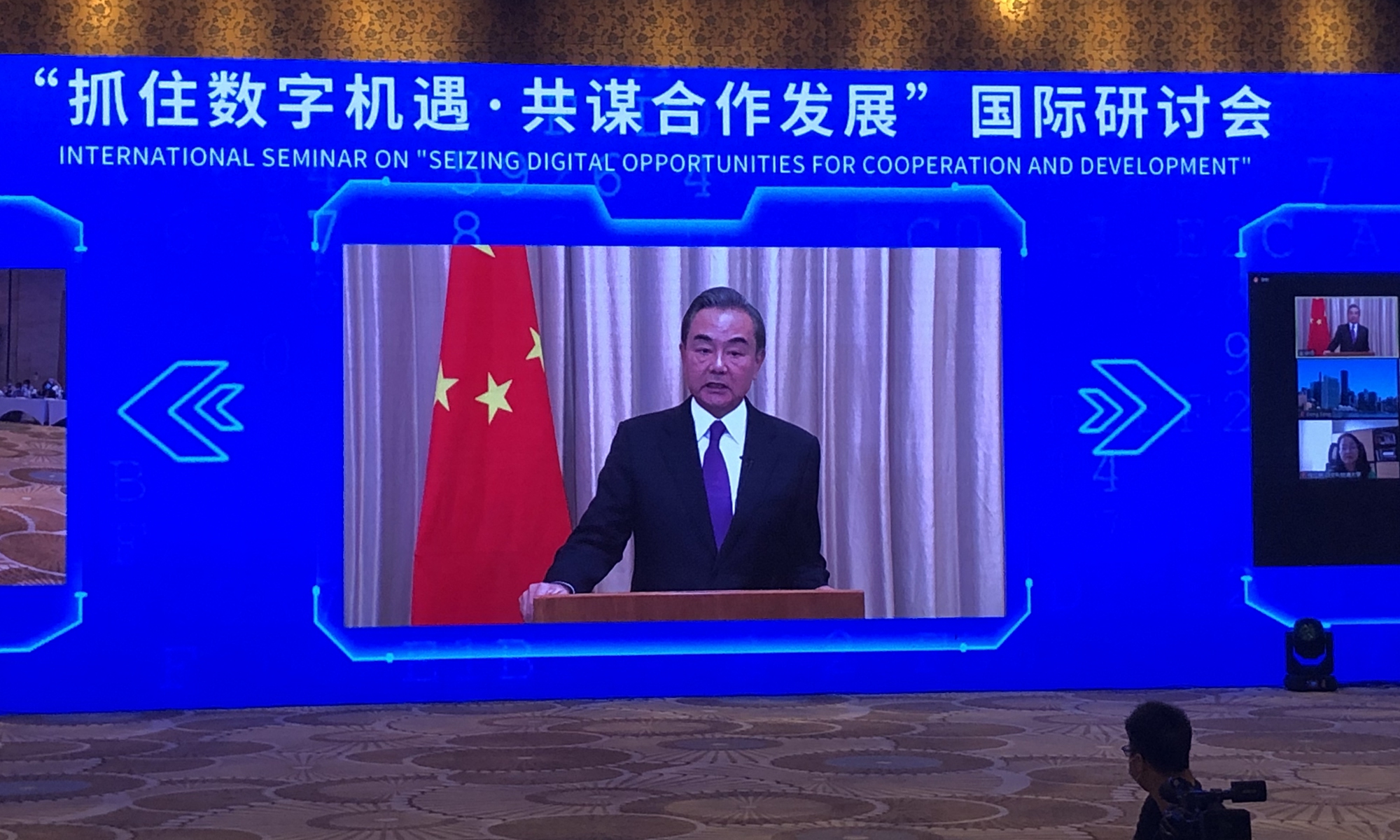China launches global data security initiative, respects data sovereignty
By Wang Wenwen and Zhang Hui Source: Global Times Published: 2020/9/8 13:03:40 Last Updated: 2020/9/8 21:06:40

Chinese State Councilor and Foreign Minister Wang Yi delivers a keynote speech via video at an international seminar on "Seizing digital opportunities for cooperation and development" on Tuesday in Beijing. Photo: Wang Wenwen/GT
China will launch a global data security initiative that can serve as a global standard for data security, Chinese State Councilor and Foreign Minister Wang Yi said via video at an international seminar on "Seizing digital opportunities for cooperation and development" on Tuesday in Beijing.
In his keynote speech, Wang also noted that China has not asked and will not ask Chinese companies to transfer overseas data to the Chinese government in breach of other countries' laws.
The initiative comes as experts believe that mounting data security risks have put national security, public interests and personal rights at stake, and pose new challenges to global digital governance.
Wang said China's initiative includes eight proposals. China suggests that states handle data security in a comprehensive, objective and evidence-based manner, and opposes ICT (information and communications technology) activities that use data to conduct activities that undermine other states' national security and interests.
China also called on states to oppose mass surveillance against other states, and not to request domestic companies to store data generated and obtained overseas in their own territory.
States should respect the sovereignty, jurisdiction and governance of data of other states, and any bilateral data access agreement should not infringe upon the judicial sovereignty and data security of a third state, Wang said.
ICT products and service providers should not install backdoors in their products and services to illegally obtain user data, or control or manipulate users' systems and devices, and that ICT companies should not seek illegitimate interests by taking advantage of user dependence on their products, nor force users to upgrade their systems and devices, Wang added.
Chinese Foreign Ministry spokesperson Zhao Lijian said at Tuesday's media briefing that the initiative aims to safeguard global data and supply chain security, promote the development of the digital economy, and provide a blueprint for the formulation of global rules. This initiative is also China's commitment to safeguard global data security.
Zhao said China is calling on all governments and companies to support its initiative, and to jointly shoulder global responsibility in the digital age.
If all countries, especially those who deliberately slander China and make groundless accusations against China, can commit like China, it will help enhance mutual trust and cooperation on data security among countries, Zhao said.
According to statistics, the number of mobile internet users has reached 3.5 billion globally, and the digital economy makes up more than 15 percent of the global GDP, while data laws and regulations differ among countries.
Qin An, head of the Beijing-based Institute of China Cyberspace Strategy, told the Global Times on Tuesday that the global data security initiative China proposes is a Chinese approach and a Chinese attitude to the global response to cybersecurity issues.
It is the detailed implementation of China's pledge at the second World Internet Conference in 2015 to "work with other countries to deepen international cooperation, uphold cybersecurity and jointly build a cyberspace of peace, security, openness and cooperation," according to Qin
The initiative adheres to China's concept of peace, after China proposed the Five Principles of Peaceful Co-Existence at Bandung Conference in 1955 and maintenance of peace and security in the second World Internet Conference, Qin said.
The seminar on Tuesday saw the participation of Chinese and foreign officials, as well as think tanks and company representatives, who held closed-door discussions about digital economic development, data security and global digital governance. They were also expected to offer suggestions on the initiative.
Wang said multilateralism is the principle that should be adhered to for the international community to effectively address the risks and challenges to data security.
"It is important to develop a set of international rules on data security," said Wang, adding, without explicitly giving a name, that "a certain country keeps making groundless accusations against others in the name of a 'clean' network and uses security as a pretext to prey on enterprises of other countries that have a competitive edge. Such blatant acts of bullying must be opposed and rejected."
The administration of US President Donald Trump has sought to block Chinese technology companies such as Huawei, citing national security reasons. In early August, the Trump administration launched a "Clean Network" initiative which aims to root out Chinese apps and other tech products from the US internet.
The US is the thief that shouts "Catch the thief" when it comes to cybersecurity, Qin said.
The US accusations against Huawei and other Chinese tech companies are not backed by evidence, and it is the US that has been carrying out mass surveillance against Chinese companies, he said.
Li Haidong, a professor at the Institute of International Relations of the China Foreign Affairs University, told the Global Times Tuesday that China's initiative should not be interpreted as specifically targeting the US.
"Data security is a global issue that matters to the future development of the world. China, as a responsible major power, is putting forward a proposal that aims to maximize the interests of all countries. It is up to other countries to make their decisions," said Li.
Philip Mai, a senior researcher and director of Business and Communications, Social Media Lab, Ryerson University, wrote in The Conversation that the US "Clean Network" initiative is tantamount to the construction of a new "digital Berlin Wall."
Posted in: DIPLOMACY